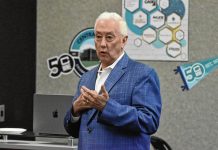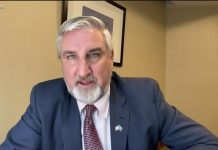A law student from Bartholomew County traveled to witness history unfold in Guantanamo Bay, Cuba.
Ben Hicks, a 2009 Columbus East High School graduate, traveled to Cuba in January to analyze and report on hearings for the five detainees charged in connection with the Sept. 11, 2001 terror attacks.
One detainee, Khalid Sheik Mohammad, is described in the 9/11 Commission Report as the principal architect of the attacks.
All five have reportedly been charged with 2,973 individual counts of murder — one for each person killed in the 9/11 attacks — as well as terrorism and providing material support for terrorism and plane hijacking.
Representing the Program in International Human Rights Law at Indiana University, Hicks, 25, is the son of Anthony and Bonnie Hicks, Jonesville Road.
Hicks said he observed or was told the circumstances surrounding the legal proceedings for the five defendants, including that jurors will be officers representing different branches of the U.S. Armed Forces and listening devices were in a room used for attorney-client consultations, although authorities there claimed they never listened in.
Although 14 other detainees have been cleared of wrongdoing, they remain at Guantanamo because no other countries will accept them, Hicks said.
With Americans deeply divided on whether such tactics are appropriate for the five 9/11 defendants, Hicks admits it’s not uncommon to hear extremism from all sides.
“Some people feel that because these detainees were tortured, we shouldn’t try them,” Hicks said. “Then, there are others who would rather see them all executed without trial.”
Even though the 9/11 attacks took place more than 15 years ago — and the five men have been imprisoned nearly that long — Hicks said he just learned at Guantanamo that the trial scheduled to being in March 2018 will likely be delayed again.
Considering the case is now entering it’s fifth year of pre-trial hearings, Hicks admits he’s overwhelmed by the “expensive, drawn out and inefficient” legal proceedings.
However, Hicks said he believes the massive amounts of expense, time and effort are all necessary to illustrate the consequences of torture, Hicks said.
A Senate Intelligence Committee report released in 2014 stated Mohammed was waterboarded at least 183 times. “There is no good solution when you do that to someone,” Hicks said. “I see this as the best of a few bad options.”
While President Obama reduced the number of detainees from 242 to 41, Hicks said the new Trump administration has made many officials at Guantanamo “very uneasy.”
“The rumors I heard down there is that they are preparing to take in 200 more detainees,” Hicks said.
Hicks believes there’s no disagreement that compassion and courtesy is the least the country owes to family members of the 9/11 victims.
In his opinion, neither were evident when a woman who lost three family members in the World Trade Center collapse wasn’t allowed to hear her husband give a court deposition, he said.
“Family members have the right to be there, and it’s a shame because she might have gotten some closure,” Hicks said.
And after several family members made the 1,300-mile flight with Hicks from Maryland to the south coast of Cuba, most only saw the defendants briefly before the judge postponed the hearing because one defense attorney had an arm injury, Hicks said.
While such postponements are common in civilian courts, Hicks said the postponement could been been announced to family members before they made the two-and-a-half-hour flight.
Hicks’ experiences during the week of Jan. 22 may have an impact on his career.
While he was simultaneously seeking an MBA and law degree that would have allowed him to practice business law, the Columbus native is now considering a career in international human rights law, he said.
Hicks said he is concentrating on his studies at the Robert H. McKinney School of Law in Indianapolis, but is hopeful to return to Cuba during his spring break.




